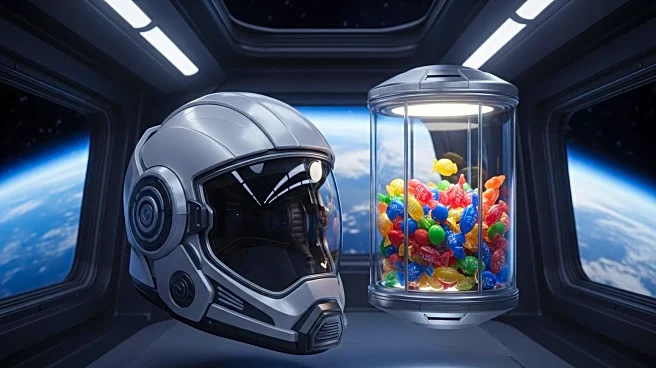What's Happening?
The Expedition 73 crew aboard the International Space Station (ISS) received an extra-large cargo delivery from Northrop Grumman's Cygnus XL supply ship. This delivery included essential science equipment and supplies, as well as care packages containing sweet treats from home. NASA astronauts Jonny Kim and Mike Fincke, along with their crewmates Zena Cardman and Kimiya Yui, unpacked the cargo, which included items like Reese's Peanut Butter Cups, Swedish Fish, and beef jerky. The delivery was part of ongoing efforts to support the crew's scientific research and daily needs while in orbit.
Why It's Important?
The arrival of the Cygnus XL supply ship is crucial for maintaining the ISS's operations and supporting the scientific research conducted by the crew. The inclusion of personal care packages boosts morale and provides comfort to astronauts during their extended missions. The research facilitated by these supplies, such as studies on bioprinted liver tissues and bone stem cells, has the potential to advance medical science both in space and on Earth. These efforts contribute to the long-term sustainability of human space exploration and the improvement of health outcomes for astronauts and patients globally.
What's Next?
The Expedition 73 crew will continue their scientific research using the newly arrived supplies. Studies on bioprinted liver tissues and bone stem cells will progress, aiming to enhance the understanding of microgravity's effects on human biology. The crew will also engage in routine maintenance of the ISS systems and prepare for future research activities. The successful docking and unloading of the Cygnus XL supply ship demonstrate the ongoing collaboration between NASA and its partners to ensure the smooth operation of the ISS.
Beyond the Headlines
The delivery of personal care packages highlights the human aspect of space exploration, emphasizing the importance of psychological well-being for astronauts. The ability to receive familiar treats from home can significantly impact the crew's mental health, fostering a sense of connection with loved ones on Earth. This aspect of space missions underscores the need for comprehensive support systems that address both the physical and emotional needs of astronauts during long-duration spaceflights.










